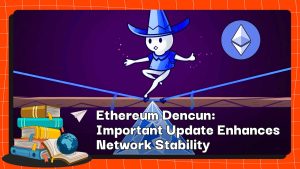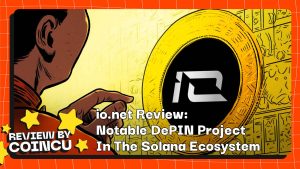What Advantages Do Zero-Knowledge Proofs Have To Create A New Security Technology Revolution?
Key Points:
- Zero-knowledge proofs have the ability to provide scalability and privacy in Web3 applications.
- ZKPs may be used in conjunction with a zero-trust architecture.
- Today’s technology applied in not only DeFi but also blockchain can also improve security thanks to ZKPs.
Although blockchain has provided several benefits, like transparency, immutability, and decentralization, it cannot provide the anonymity required for particular transactions. Combining zero-knowledge proofs (ZKPs) with blockchain technology, on the other hand, has the potential to offer users a strong blend of immutability and security.
This article will provide an overview of zero-knowledge proofs. The benefits and drawbacks of ZKP technology, as well as the possibilities for the future.
What are zero-knowledge proofs?
Zero-knowledge proofs, which are mathematical techniques used in cryptography to verify the authenticity of data without disclosing it, have grown in favor of the Web3 community in recent years due to its ability to provide scalability and privacy in Web3 applications.
ZKP allows several data points to be combined in a single, lightweight proof, which improves efficiency and scalability. And, because blockchain technology is known to require massive computing power, limiting its scalability, ZKP can assist developers in creating lightweight decentralized applications (dApps) that can run on more common hardware devices such as mobile phones, allowing Web3 to be more accessible and scalable, according to the survey.
In terms of privacy, ZKPs may allow users in Web3 – whether in DeFi, DAOs, or the metaverse – to securely communicate information necessary for getting access to products and services without releasing personal data that might leave a user vulnerable to hacking, exploitation, and identity theft.
Despite the fact that ZKP is used to improve the functionality of blockchain, the protocol predates the inception of the decentralized ledger by forty years. In the 1980s, MIT researchers Silvio Micali, Shafi Goldwasser, and Charles Rackoff pioneered the approach.
There are two types of zero-knowledge proofs: interactive proofs and non-interactive proofs.
Interactive ZKPs include a set of activities or actions that the prover must do in order to persuade the verifier that they have certain knowledge. The majority of the needed activities in interactive ZKPs mainly include mathematical probability principles.
Non-interactive ZKPs do not need interaction between the prover and verifier, or the verification may be performed afterward. Some ZKPs need the use of extra computers or software.
Any zero-knowledge proofs must meet three requirements:
- Completeness: If a statement is true, the verifier may verify that the prover has the necessary input.
- Soundness: The assertion cannot be faked, and the verifier cannot be persuaded that the prover has the necessary input when they do not.
- Zero-knowledge: The verifier will have no knowledge of anything other than whether the assertion is true or untrue. The details of the information and personal data of the third parties are kept private.
The benefits and drawbacks of zero-knowledge proofs
Zero-knowledge proofs, like all other types of technology, has its own set of benefits and drawbacks:
Advantages of Zero-knowledge proofs
- Blockchain Scalability: ZK Rollup solutions leverage ZKP technology to boost throughput and scalability for layer 1 Blockchains; examples are StarkNET, Loopring, and Zksync.
- Privacy and security: Zero-knowledge proofs technology aids in confirming the completeness and accuracy of data without disclosing sensitive information; therefore, beyond an application in layer 2, it aids in increasing extension ability. Zero-knowledge technology (ZKP) is also used in security and privacy layers in applications like Monero, Zcash, and…
Limitations of Zero-knowledge proofs
- Large quantities of processing power are required: ZKP procedures are often based on difficult mathematical formulae. As a result, they demand a significant amount of computer power to run and calculate. This implies that regular computers will have a tough time participating in the transaction validation process.
- Not suitable for developers: One of the primary applications of Zero-knowledge proof (ZKP) is for Layer 2 technologies to boost scalability for Blockchain, however, its usage is now confined to basic payments and transactions. Moreover, Zk Rollup does not presently enable compositing, and various Zk Rollup programs cannot interact with one other in the same Layer 2.
Zero Trust vs. Zero Knowledge
The term “zero knowledge” refers to the particular cryptographic approach of zero-knowledge proofs, while “zero trust” refers to a generic cyber security strategy used by businesses to secure their data, premises, and other resources.
The zero-trust architecture implies that every person and device, both within and external to the network, may pose a danger owing to malevolent activity or incompetence. Zero-trust systems need users and devices to be verified, approved, and continually validated before access to resources is provided in order to reduce risks.
Zero-knowledge proofs may be used in conjunction with a zero-trust architecture. Employees, for example, may use zero-knowledge authentication systems to get access to their organization’s network without revealing personal information.
Zero-knowledge proofs’ role in DeFi
The financial community is one area of concentration for ZKPs. With the expanding use of DeFi, zero-knowledge apps with scalability and privacy advantages have a greater possibility to aid in the industry’s broader acceptance.
From its inception, DeFi has been seen as a solution to the inefficiencies of the “conventional” global financial system by many tech-savvy traders and investors. DeFi eliminates the intermediary regulator (and related costs) by using public blockchains such as Bitcoin and Ethereum for peer-to-peer transactions. When the American economy enters the bear market territory, many exhausted traders are turning to DeFi.
True user empowerment will not exist without privacy, which is a critical component of making the decentralized web a reality. Given how susceptible such sensitive financial information data may be to hacks and thefts, the finance sector stands to profit the most from ZKP solutions. ZKPs can help safeguard financial data, making Web3 safer for everyone.
Zero-knowledge proofs’ role in blockchain
Users that seek control and independence over their information might benefit from ZKPs’ flexibility and choice. As a result, it stands to reason that blockchain and ZKPs have various applications when combined.
ZK Rollup solutions enable Ethereum and another layer 1 blockchain to expand rapidly by enabling quick transaction validation and verification.
Moreover, Blockchains that use ZKP technology, such as the Mina Protocol, promise to develop the next generation of Blockchain in the Crypto sector.
End-to-end encryption has played an important role in enabling communications to be exchanged secretly. Traditional messaging apps, on the other hand, need users to authenticate themselves on a server. An individual may use ZKPs to confirm their identity without disclosing any further personal information.
By combining ZKPs and blockchain, users may securely communicate complicated documents. ZKPs may encrypt data in chunks, allowing users to manage certain blocks and the availability of the information stored inside them, allowing some users access while limiting others.
Conclusion
Blockchain has its own set of advantages and disadvantages. Even though it appeared good at first, it does carry a lot of baggage. These flaws are impeding the development of this excellent technology.
Things have begun to change, however, with the development of the zero-knowledge proofs system – the knight in shining armor. Blockchain may now be the ultra-secure platform that everyone longed for.
DISCLAIMER: The Information on this website is provided as general market commentary and does not constitute investment advice. We encourage you to do your own research before investing.
Join us to keep track of news: https://linktr.ee/coincu
Harold
Coincu News






















